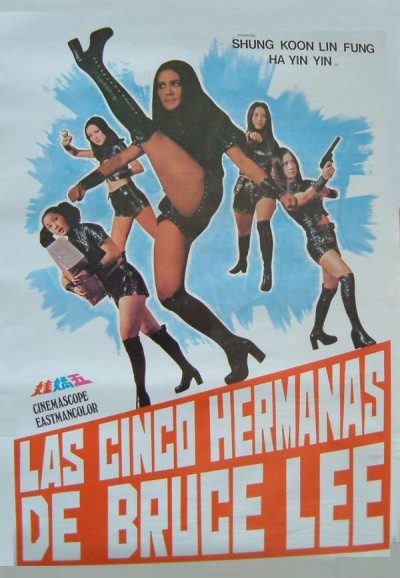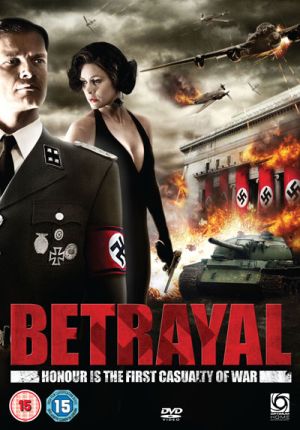★★
“Maybe it makes more sense if you’ve played the video-game?”
 I might have enjoyed this more, if I hadn’t recently sat through 25 episodes of basically the same plot, in Blood+. Generic anime storyline, #7: supernatural entity, trying to bring about the end of the world because… That’s what they do? In this case, there are sages and witches, who balance good and evil. 500 years ago, however, one from each side united, and the offspring was Bayonetta (Tanaka). She is now taking out angels, but there’s also a religious cult preparing for the rebirth of their saviour, a journalist who blames Bayonetta for the death of his father, and a mysterious, very whiny little girl, who keeps calling her “Mommy”. Who that turns out to be will surprise no one.
I might have enjoyed this more, if I hadn’t recently sat through 25 episodes of basically the same plot, in Blood+. Generic anime storyline, #7: supernatural entity, trying to bring about the end of the world because… That’s what they do? In this case, there are sages and witches, who balance good and evil. 500 years ago, however, one from each side united, and the offspring was Bayonetta (Tanaka). She is now taking out angels, but there’s also a religious cult preparing for the rebirth of their saviour, a journalist who blames Bayonetta for the death of his father, and a mysterious, very whiny little girl, who keeps calling her “Mommy”. Who that turns out to be will surprise no one.
I had to piece together the above, and it’s kinda vague in some areas, I suspect largely because there’s an unspoken assumption that, if you’re watching this feature, you’ve played the video-game on which it is based. Now, that’s probably not an unfair assessment for the majority of viewers. However, any casual spectator (and I certainly fall into that category) is likely to be somewhere between confused and bored by the approach, which seems to gloss over stuff that warrants more exposition, and explains in details things that shouldn’t need it. For instance, at one point, Bayonetta is on a train, and is attacked by another woman, leading to a spectacular battle in, on and around the carriages. The attacker then vanishes from the movie for a long period, without explanation. Game players, I suspect, will know the who and why, far better than I did; to me, it just felt disjointed and badly constructed.
Which is a shame. I used the word “spectacular” in the previous paragraph, and there’s no questioning that aspect of proceedings. The look here is very stylized and elegant, especially during the numerous fight sequences, both imaginative and well-animated. in a way that reminded me, in some aspects, of the early Aeon Flux animated shorts. It’s just a pity this obvious effort wasn’t expended on a feature which provides little more than fan service, both in the storyline and a rather leering approach to its lead character, that is significantly less mature than the subject matter deserves. While I understand and accept Bayonetta herself is, to a certain extent, intended to be a parody of this kind of OTT character, the movie is probably only recommended if you’re looking for an animated superheroine who resembles Tina Fey impersonating Sarah Palin. I get the feeling that is likely to be just a little bit too much of a niche market.
Dir: Fuminori Kizaki
Star (voice): Atsuko Tanaka, Norio Wakamoto, Tesshō Genda, Mie Sonozaki





 There’s something almost theatrical about this, because virtually the entire film takes place in a single location, the downscale home of Lorna (Gershon), who has just knocked her husband Dale (Kilmer) out with a frying-pan, after discovering he was apparently involved in a bank robbery which netted $100,000. She has now called over her best friend, local barmaid Tiny (Giddish), to try and decide what to do next, with the first step being to find the loot, which Lorna is convinced Dale has hidden somewhere in their home. However, the local sheriff (Liotta) is also sniffing around, being fully aware of Dale’s fondness for armed robbery in his younger days. It’s not long before the dead bodies are piling up, requiring alternative uses to be found for the turkey carver and industrial-strength blender. And that’s just the start of the unpleasantness.
There’s something almost theatrical about this, because virtually the entire film takes place in a single location, the downscale home of Lorna (Gershon), who has just knocked her husband Dale (Kilmer) out with a frying-pan, after discovering he was apparently involved in a bank robbery which netted $100,000. She has now called over her best friend, local barmaid Tiny (Giddish), to try and decide what to do next, with the first step being to find the loot, which Lorna is convinced Dale has hidden somewhere in their home. However, the local sheriff (Liotta) is also sniffing around, being fully aware of Dale’s fondness for armed robbery in his younger days. It’s not long before the dead bodies are piling up, requiring alternative uses to be found for the turkey carver and industrial-strength blender. And that’s just the start of the unpleasantness. Four years after Bruce Lee’s death, and film-makers were still trying to fool moviegoers into believing their product had some connection to kung-fu’s first global star. Not sure where the deception occurred, as the print here simply overlays the new title over the (still-legible) Hong Kong one,
Four years after Bruce Lee’s death, and film-makers were still trying to fool moviegoers into believing their product had some connection to kung-fu’s first global star. Not sure where the deception occurred, as the print here simply overlays the new title over the (still-legible) Hong Kong one, 
 This is the third version of the same concept I’ve seen, following some years after the
This is the third version of the same concept I’ve seen, following some years after the 


 “I’m a Barbie girl, in a Nazi world…” That’s an equally appropriate summary here, because the heroine in this flick, set in occupied Norway during World War II, was the lead singer of Aqua, famous (or notorious, if you prefer) for a certain catchy pop ditty. She plays – and I know you’ll find this a stretch – a singer, who works in a nightclub, which caters for high-ranking Nazi officers, while she simultaneously works with the local resistance and beds SS Major Kruger (Otto). The Allies are seeking plans of a local aluminium smelting plant, a key cog in the Third Reich’s war machine, so an airstrike can be called down on to it. Local businessman Tor Lindblom (Saheim) partners with Kruger to profit from the industrial operation, and play both sides, until their pet auditor is replaced by one rather less amenable to their embezzlement.
“I’m a Barbie girl, in a Nazi world…” That’s an equally appropriate summary here, because the heroine in this flick, set in occupied Norway during World War II, was the lead singer of Aqua, famous (or notorious, if you prefer) for a certain catchy pop ditty. She plays – and I know you’ll find this a stretch – a singer, who works in a nightclub, which caters for high-ranking Nazi officers, while she simultaneously works with the local resistance and beds SS Major Kruger (Otto). The Allies are seeking plans of a local aluminium smelting plant, a key cog in the Third Reich’s war machine, so an airstrike can be called down on to it. Local businessman Tor Lindblom (Saheim) partners with Kruger to profit from the industrial operation, and play both sides, until their pet auditor is replaced by one rather less amenable to their embezzlement. According to the film’s introductory narration, Thailand now has about three women for every man. This has led to many men both having an “official” wife, while also keeping a mistress, and not exactly being secretive about it – when the wife dies, the mistress gets “promoted” to replace her, which has obvious implications for both parties. In order to protect their rights, the eives form an association, the FCWI, which stands for First Class Wives International. Not to be outdone, the mistresses do the same thing, with the ECWI (Economy Class Wives International). After two members of the former are gunned down on a stretch of highway, the two groups seem set for a fiery and murderous collision between the wives and mistresses.
According to the film’s introductory narration, Thailand now has about three women for every man. This has led to many men both having an “official” wife, while also keeping a mistress, and not exactly being secretive about it – when the wife dies, the mistress gets “promoted” to replace her, which has obvious implications for both parties. In order to protect their rights, the eives form an association, the FCWI, which stands for First Class Wives International. Not to be outdone, the mistresses do the same thing, with the ECWI (Economy Class Wives International). After two members of the former are gunned down on a stretch of highway, the two groups seem set for a fiery and murderous collision between the wives and mistresses.